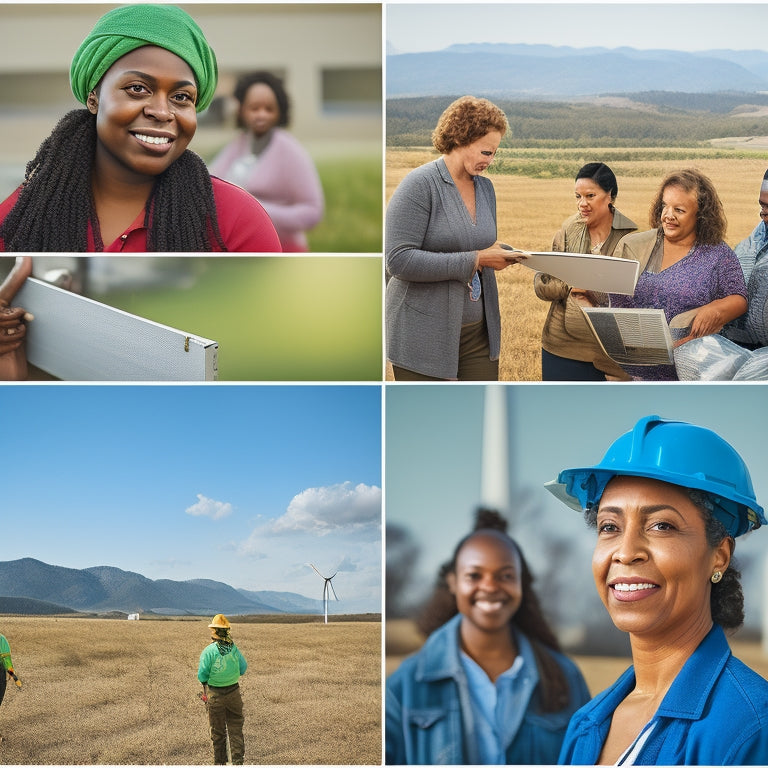
Empowering Clean Energy Careers: Diverse Training Programs
Share
The clean energy sector's rapid evolution demands a workforce empowered with diverse training programs, enabling professionals to drive innovation, growth, and a sustainable future. Expert-led training and education equip industry professionals with practical skills and industry certifications, ensuring workforce readiness for a low-carbon economy. Inclusive training programs and mentorship opportunities promote industry diversity, tapping into a broader talent pool for industry resilience. To build a robust and resilient industry, investment in workforce development is vital. As the sector continues to evolve, maximizing the full potential of clean energy careers will require a deep understanding of the complex relationships between technology, policy, and workforce development.
Key Takeaways
• Diverse training programs empower clean energy professionals to drive innovation and growth in the industry.
• Access to specialized training programs and leadership roles enables professionals to enhance their expertise and pursue various career pathways.
• Inclusive training programs promote industry diversity, tapping into a broader talent pool for industry resilience and a sustainable future.
• Mentorship programs and networking events support career growth, providing professionals with opportunities to build connections and stay updated on industry trends.
• Investment in workforce development builds a robust and resilient industry, supporting a low-carbon economy and a sustainable future.
Expert-Led Training and Education
Through expert-led training and education, clean energy professionals can stay abreast of the latest industry developments, best practices, and emerging trends, ensuring a workforce equipped to propel the shift to a low-carbon economy.
By providing expert perspectives and hands-on training, professionals can develop the practical skills necessary to excel in their roles. Industry certifications and specialized training programs offer a pathway to career advancement, enabling professionals to stay competitive in a rapidly evolving industry.
Industry Insights and Trends
As the clean energy sector continues to evolve, staying attuned to industry insights and trends is essential for professionals to navigate the complexities of a rapidly changing landscape.
The clean energy workforce must adapt to emerging renewable energy trends, such as the integration of efficiency technologies like heat pumps and induction stoves.
Industry initiatives, like the IREC Vision Summit 2023, focus on advancing public policy, renewable energy, and energy efficiency.
Additionally, collaborations between organizations, such as NBI, Forth Mobility, and expert reviewers, drive workforce development aligned with community needs.
Guidelines for Clean Energy Systems
Establishing clear guidelines for clean energy systems is essential to ensuring the safe, efficient, and widespread adoption of renewable energy technologies, particularly in the areas of solar and energy storage installations. Guidelines provide a framework for industry professionals to follow, ensuring consistency and quality in their work.
| Guideline Category | Description |
|---|---|
| Permitting Requirements | Outlines necessary permits and approvals for solar and energy storage installations |
| Installation Guidelines | Provides step-by-step instructions for safe and efficient installation |
| Safety Codes | Specifies electrical and fire safety standards for clean energy systems |
| Building Practices | Offers recommendations for integrating clean energy systems with building design and construction |
Empowering Clean Energy Professionals
By providing access to diverse training programs, industry experts, and resources, clean energy professionals can develop the skills and knowledge necessary to propel the shift to a low-carbon economy.
This empowerment enables the clean energy workforce to stay ahead of the curve, driving innovation and growth in the industry.
Through professional development opportunities, professionals can enhance their expertise, staying current with the latest technologies, guidelines, and standards.
By investing in the clean energy workforce, we can build a robust and resilient industry that supports a sustainable future.
Diverse Career Development Opportunities
Clean energy professionals can leverage a wide range of career development opportunities, from specialized training programs to leadership roles, to drive innovation and growth in the industry.
As the clean energy sector continues to evolve, diverse career pathways emerge, offering professionals a chance to upskill and reskill. Inclusive training programs provide a platform for individuals from underrepresented groups to enter and advance in the industry.
Career development opportunities also include mentorship programs, networking events, and professional certifications. By investing in their careers, clean energy professionals can stay ahead of the curve, drive innovation, and contribute to a sustainable future.
With a focus on inclusivity and diversity, the industry can tap into a broader talent pool, fostering a more resilient and effective workforce.
Frequently Asked Questions
What Is the Average Time Required to Complete the Solar Industry Career Exploration Course?
The Solar Industry Career Exploration Course is designed to be self-paced, allowing individuals to complete the 8 modules at their own pace, with an estimated average time commitment of 4-6 hours for completion.
How Do I Access the Clean Energy Resources and Training Developed With NBI and Forth Mobility?
"Unlock seamless access to Clean Energy Resources and Training through our strategic Energy Partnerships, expertly guiding you through Resource Navigation, and empowering you to thrive in the ever-evolving clean energy landscape."
Can I Earn Continuing Education Credits by Attending the Webinars and Panel Discussions?
Through our webinars and panel discussions, professionals can earn continuing education credits, enhancing their professional development and industry recognition, while staying abreast of the latest clean energy trends and best practices.
What Is the Focus of the Resilient Building Practices Training Program?
As the ancient Greeks sought to build temples that withstood the test of time, the Resilient Building Practices training program focuses on sustainable design and climate resilience, emphasizing durable and sustainable shelter for a stronger, more resilient future.
Are the Training Programs Available Online or In-Person Only?
Our training programs offer flexible schedules, combining online self-paced modules with optional in-person sessions, providing hands-on experience and catering to diverse learning styles, ensuring accessibility and convenience for all participants.